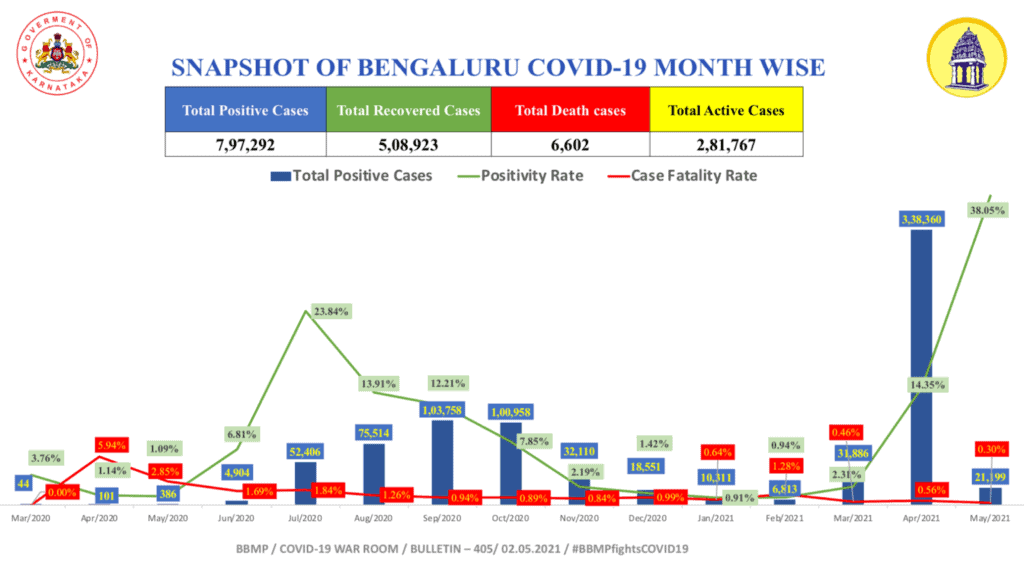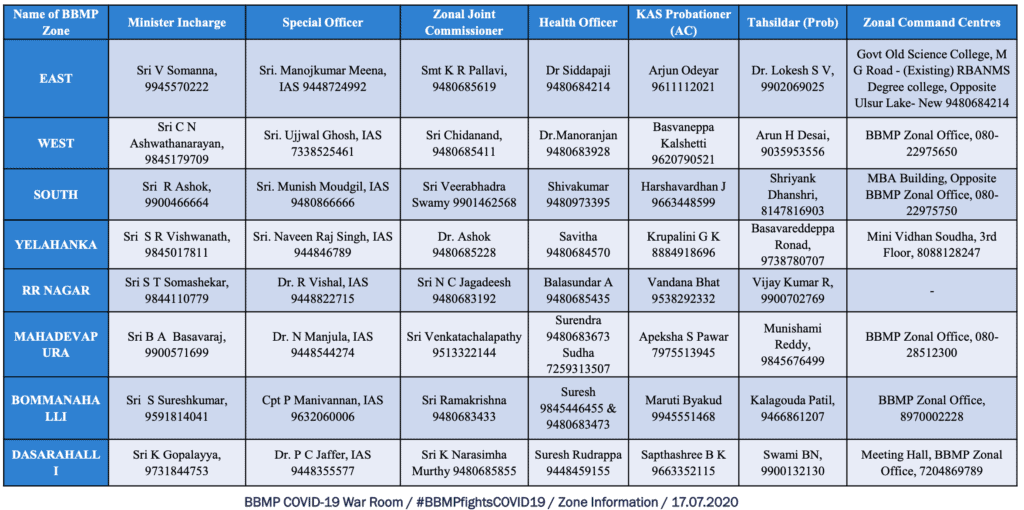In the view of the rapidly rising COVID cases and deaths in entire families, the State government and the Bruhat Bengaluru Mahanagara Palike (BBMP) have, over the last two days, ordered measures to deal with emergency requirements such as setting up of ICU beds, support for orphaned children, monitoring oxygen supply and modifying home-isolation protocols.
While the direction of oxygen monitoring and supply came after the tragedy at the Chamarajanagar district hospital, where 23 COVID patients succumbed due to lack of oxygen, the government also appointed IAS officers to take care of children orphaned due to the pandemic. A nodal officer was expressely named to streamline aid from corporates, NGOs and private institutions.

Nodal officers for orphaned kids, corporate aid, ICU beds
Inspector General of Registrations and Commissioner of Stamps, K. P. Mohan Raj (IAS), has been appointed as the nodal officer for identifying children who are orphaned due to COVID-19 and ensure necessary support and facilities for them and also make long-term arrangements for their care and well-being.
Principal secretary, Rural Development and Panchayat Raj, Uma Mahadevan (IAS), has been appointed as the nodal officer for coordination with the corporate / private sector and NGOs for aid pertaining to COVID-19 response. This is done to ensure mobilisation and optimisation of resources being offered by the NGOs and Corporates who have come forward to assist the State.
Commissioner of information and public relations, P. S. Harsha (IPS) has been appointed as the nodal officer for setting up 500 ICU beds for COVID-19 patients in every BBMP Zone, considering the surge of infections in the Bengaluru area.
Read More: What to do if you test positive for COVID in Bengaluru
Remdesivir not meant for home isolation
With caseload burden weighing on the inadequate health system in the city, home isolation is being encouraged for asymptomatic and mildly symptomatic patients. Revised guidelines for patients in home-isolation / home care / COVID Care Centres (CCC) were released on Saturday by the Government of Karnataka.
The guidelines provide the names of medicines and information as to how and when they are meant to be administered. All the medicines are subject to prescription by the treating physician / doctor. Warm water gargles and steam inhalations are recommended twice a day. The guidelines clearly state that Remdesivir must not be procured or administered at home and must only be administered in a hospital setting after prescription by a medical professional.
Guidelines_for_Home_Isolation_May1_2021
Read More: Coping with COVID, a challenge for Bengaluru’s seniors
CCCs through RWAs
With the shortage in oxygen and hospital beds for critical patients, COVID Care Centres are being built all across the city for the isolation of asymptomatic and mildly symptomatic COVID-19 patients, so that the hospital beds can be reserved for the critical patients with comorbidities.
On Saturday, BBMP Chief Commissioner Gaurav Gupta held a meeting with the RWAs where he announced that RWAs are allowed to set up and manage CCCs in their apartment complexes with the approval of the zonal commissioner, given there is space in the premises.
Health officers will visit the apartments to inspect if there is adequate space to set up a CCC in the premises. He also informed that BBMP helpline 1912 has been increased to 500 lines for the access of the public.

Guidelines-for-CCC-by-RWAs_Apartments
Explaining the prerequisites for setting up a CCC at the apartment complex, Chief Health Officer Dr. Vijendra, said that the apartment complexes must have a community hall in the premises, a separate area for women and children, 10×10 feet toilet. The room must be spacious and beds must be at least 6 feet apart from each other. He also said that there will be a separate tender system for collecting medical waste.
CCCs at apartment complexes will tie up with the nearby hospital / nursing home to provide treatment for the patients. One doctor will be assigned to every 100 beds, one staff for 50 beds, and one Group-D employee per 25 beds. The facility must have masks, sanitisers, thermal scanner, pulse oximeter, PPE kits, and essential tablets. It should also have an ambulance in case of emergency. The CCC must have a data entry operator to collect the information.
A new advisory for RWAs has also been released on the same day with guidelines on social distancing, cancellation of mass gatherings, and handling of domestic workers as well as COVID Positive residents. There are also instructions regarding the care of children and the elderly.
Social distancing in common areas and constant dis-infection of such areas as well as closed spaces like lifts have been instructed. Gymnasiums, Sports Facilities, and Club Activities are not allowed. RWAs have been asked to co-operate with health officials and ensure home quarantine without any stigmatisation or abuse of the patients or their families. Screening of all domestic workers as well as visitors has been mandated along with a bi-monthly RT-PCR testing of domestic workers.
Residents have been requested to keep the RWAs in the loop in case of the development of any symptoms or positive test reports. Children and the elderly have been told to minimise travelling or leaving the house in any way and stay at home. Parents have been advised to teach their children hand hygiene and cough etiquette along with keeping them engaged at home in creative ways.
Oxygen Monitoring and Supply
After the unfortunate incident in a Chamarajanagar hospital where 24 COVID patients died after oxygen shortage, the state government released an order on oxygen supply mandating the appointment of a Camp Officer to report daily on the oxygen stocks in Re-Filler Agencies. It reiterates the order dated April 26, 2021, which stated that liquid oxygen will only be used for medical purposes and it is a criminal offence to divert it from COVID-19 patients.
Read More: Where do Bengaluru hospitals get their oxygen supply from?
From now on, BBMP has to furnish a detailed and accurate account of supply of oxygen to hospitals every day. In fact, this data will be available in the public domain. A Camp Officer will be appointed by BBMP for every Re-Filler station who will oversee and ensure medical oxygen supplies to hospitals. A Special Commissioner in BBMP will be made the Oxygen Nodal Officer and ensure the compliance of this order. In every taluk in other districts, the Camp Officer appointed would be of the rank of Tahsildar.
Regarding-Oxygen-Supply-Order-03-05-2021
Wider shopping window
After the 14-day “close down” declared by the Karnataka government on April 28, the essential groceries were allowed to be sold only from 6 am to 10 am in the morning. Since this short window was leading to crowding, a new order was released on Saturday to widen the window from 6 am till 12 noon for APMCs and grocery shops. Hopcoms, milk booths, sale of fruits and vegetables on pushcarts has been allowed from 6 am to 6 pm.
[Compiled by Juhi Jotwani]
Also Read: